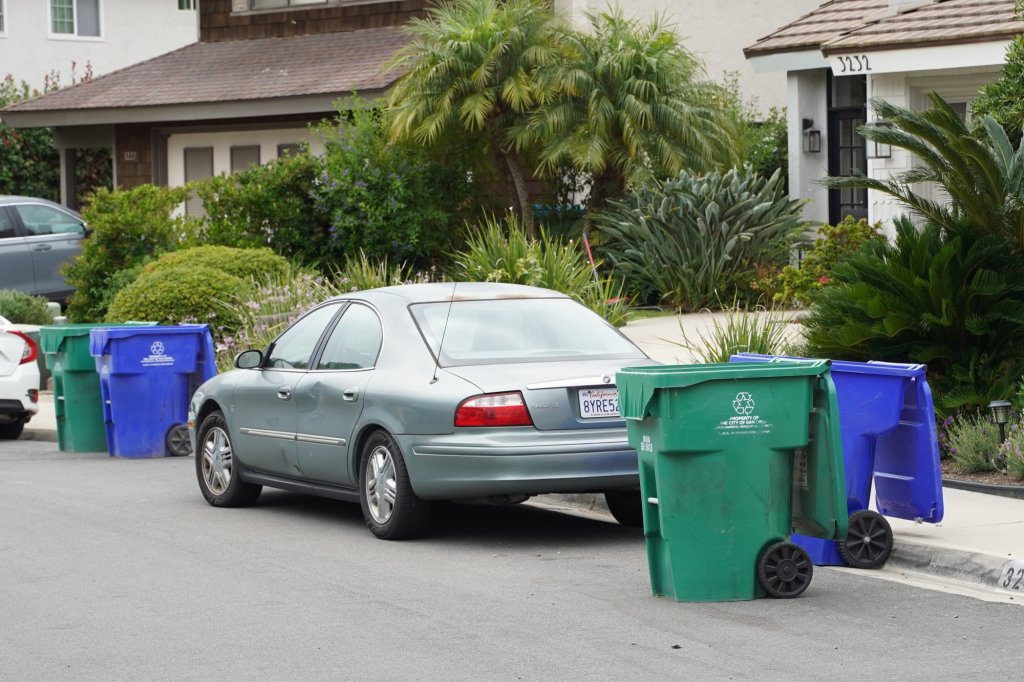San Diego finalized a controversial plan Monday to replace hundreds of thousands of trash and recycling bins — many of them new or only a few years old — and send the $65 million bill to customers.
City officials say the move is part of upgrading service just as San Diego begins levying its first-ever trash pickup fee.
They contend the new cans will boost dependability, reliability and accountability because they are equipped with special tracking chips and will look different than the old cans so that crews can recognize them.
The new cans, which city crews are scheduled to start delivering to customers Oct. 6, will be light blue for recycling and gray for trash — replacing dark blue recycling cans and black trash cans. Green bins are not being replaced.
Critics say the city’s decision to buy 750,000 new cans and dispose of 950,000 existing cans is bad for the environment and helped drive up the $43.60 monthly fee the city began charging customers July 1.
The City Council voted 6-3 Monday to approve buying the new cans, with support from the same six members who supported the new trash fee June 9.
They are Councilmembers Joe LaCava, Sean Elo-Rivera, Kent Lee, Jennifer Campbell, Stephen Whitburn and Vivian Moreno.
“It’s going to be really important that folks feel a tangible improvement in service delivery,” said Elo-Rivera, contending that goal justified the $65 million expense.
Councilmember Marni von Wilpert, who was joined in opposition by Councilmembers Raul Campillo and Henry Foster, said the plan to replace so many containers was a key reason she opposed the new trash fee last month.
“I didn’t think we needed to charge people $45 million for new containers,” she said. “It’s way too high. I’m very sad we are doing this.”
The city is paying $41.5 million for 750,000 gray and light blue containers and another $23.2 million to have the new containers delivered and 950,000 old containers taken away and recycled.
City officials say replacing the bins was only a minor factor in the size of the new trash fee, stressing that they are a one-time cost versus a recurring cost like adding bulky trash pickup.
In addition, the city softened the immediate impact by spreading the cost of the cans over 10 years. That’s because the city is financing its purchase instead of paying the entire sum up-front.
Officials also note that more than 75 percent of existing containers are more than 20 years old — more than double the manufacturer’s estimated lifespan of 10 years.
“They are largely old, brittle and subject to breakage,” said Jeremy Bauer, assistant director of the city’s Environmental Services Department.
But critics say many of the cans are new or only a few years old because customers are constantly replacing old cans with new ones.
Bauer said the tracking chips are another key reason for the switch.
“It’s essential that we know who our customers are and how many containers they have so that we can charge each one appropriately,” he said. “This is the most practical and efficient way.”
State Proposition 218 requires government agencies to carefully track their customer base when charging them fees.
The new colors are also important, Bauer said.
“The new light gray and the new light blue containers will allow our drivers to clearly distinguish which containers pertain to paying customers — ensuring we only pick up from paying customers,” he said.
In addition, Bauer said many of the older containers would have been replaced no matter what, because customers are being given the chance to pay less if they agree to use smaller trash cans.
A city website allowing customers to select their container sizes is scheduled to go live Tuesday. Customers must choose by the end of September, and delivery of new bins will start Oct. 6 and last through next summer.
Customers who lack internet access can call to choose their new containers. Customers will also start receiving mailers this week letting them know about the new website.
If a customer fails to choose a can size, they will be sent 95-gallon gray and light blue cans — the largest size. But they will have 30 days to swap those cans out for smaller versions for free.
City officials say questions can be asked at (858) 694-7000 or by email to trash@sandiego.gov. The city’s trash website is sandiego.gov/trash-service-updates.
San Diego residents living in single-family homes or in multifamily developments with four or fewer units must start paying for trash service because of a narrowly approved 2022 ballot measure that repealed a century-old policy giving them the service for free.
